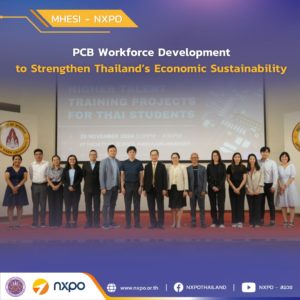On 24 May 2023, NXPO held Executive Board Meeting chaired by Prof. Dr. Anek Laothamatas, Minister of Higher Education, Science, Research and Innovation (MHESI). The discussion focused on university holding company policy as a strategy to drive an innovation-driven economy.

In his opening remarks, Prof. Dr. Anek Laothamatas said that MHESI is expected to play a key role in transitioning Thailand into a developed country through both an innovation-driven economy and a creative economy. The ministry’ role is not limited to teaching and doing research, but also driving the economy via innovation-driven enterprises (IDEs) and a creative industry and NXPO is entrusted with an important task of being a think tank to design clear and effective policies.

Minister Anek added that the shift in geopolitical and economic landscape presents opportunities for Thailand to be chosen by multinational corporates to relocate their manufacturing and research activities to, based on our strategic location, well-developed infrastructure and skilled workforce.

NXPO President Dr. Kitipong Promwong reported that NXPO had presented the proposal on university holding company policy to the innovation ecosystem subcommittee of the Policy Council on 25 December 2020. The subcommittee granted an approval on 1) encouraging universities to establish and operate a holding company via a legal framework, 2) financing university holding companies to make joint investments, 3) revising university regulations to promote investment in innovation-driven businesses, 4) fostering startups and spinoffs created by universities, and 5) encouraging university holding companies to co-invest with industry partners.

Furthermore, at its meeting on 2 June 2021, the subcommittee endorsed a guideline for the establishment and operation of a holding company by universities and public research institutes. Six holding companies have been set up, leading to a creation of and investment in at least 44 enterprises. CU Enterprise, a holding company of Chulalongkorn University, established a holding company for each of its faculty to invest in businesses originated from the respective faculty. CU Enterprise and CU Innovation Hub rolled out University Holding Company Directorship Certification Program (UHCDP) to train present and future executives of holding companies on the management of innovation-driven businesses.

Thailand has made considerable investment in STI infrastructure and human resource development in the past three decades, one of which is regional science parks. At present, there are five regional science parks with a new addition soon to be launched in Nakhon Ratchasima. Situated in Chiang Mai University, CMU STeP is the first regional science park in Thailand. The park has grown to become a prominent establishment in the north, empowering small businesses to increase their earnings from THB 1-2 million to hundreds of millions. Holding companies coupled with science parks can multiply IDEs and help free the country from the middle-income trap by 2037.

“The goal of creating a thousand new IDEs with THB-1-billion revenue in five years is achievable. Current data showed that each university has several companies with revenue in the order of THB 100 million in its portfolio, and some of these companies has potential to become a unicorn. Combining with enterprises in the universities’ incubation programs and other independent corporates, a thousand IDEs with THB-1-billion revenue is not far-fetched,” Dr. Kitipong said.

The new policy has birthed a number of new holding companies. Chiang Mai University founded Ang Kaew Holding Company in 2018 with the following investment policy: 1) investing in specialized enterprises, 2) joint investment with companies already established in the industry, 3) converting IPs to capital assets, and 4) investing in high potential startups. At a THB-1-million registered capital, Ang Kaew now has eight companies in its portfolio and two under negotiation. The company is expected to raise its registered capital to THB 10 million this year.

Chulalongkorn University established CU Enterprise as a sandbox in 2018 with two main objectives, one being to exploit its IPs and two being to incubate new businesses spun off from its innovations. CU Enterprise has had over 300 projects under its incubation program – 200 in digital technology and 100 in deep tech – and launched 150 startups, including 50 enterprises created by faculty members. In 2024, CU Enterprise aims to grow deep tech startups to reach a combined value of THB 50 billion.







